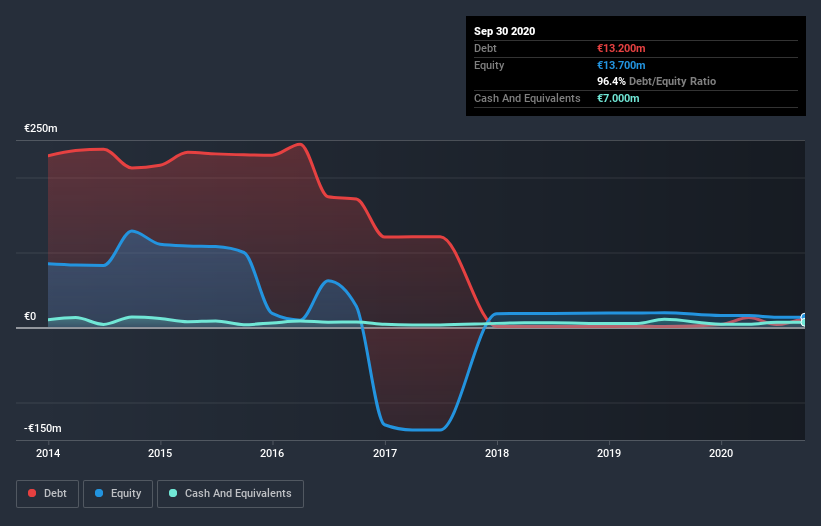Legendary fund manager Li Lu (who Charlie Munger backed) once said, 'The biggest investment risk is not the volatility of prices, but whether you will suffer a permanent loss of capital.' It's only natural to consider a company's balance sheet when you examine how risky it is, since debt is often involved when a business collapses. As with many other companies Componenta Corporation (HEL:CTH1V) makes use of debt. But the real question is whether this debt is making the company risky.
What Risk Does Debt Bring?
Debt assists a business until the business has trouble paying it off, either with new capital or with free cash flow. In the worst case scenario, a company can go bankrupt if it cannot pay its creditors. While that is not too common, we often do see indebted companies permanently diluting shareholders because lenders force them to raise capital at a distressed price. Of course, debt can be an important tool in businesses, particularly capital heavy businesses. When we think about a company's use of debt, we first look at cash and debt together.
Check out our latest analysis for Componenta
What Is Componenta's Net Debt?
As you can see below, Componenta had €4.00m of debt, at June 2020, which is about the same as the year before. You can click the chart for greater detail. However, its balance sheet shows it holds €7.00m in cash, so it actually has €3.00m net cash.

How Healthy Is Componenta's Balance Sheet?
Zooming in on the latest balance sheet data, we can see that Componenta had liabilities of €22.4m due within 12 months and liabilities of €20.6m due beyond that. Offsetting this, it had €7.00m in cash and €3.80m in receivables that were due within 12 months. So its liabilities total €32.2m more than the combination of its cash and short-term receivables.
This deficit casts a shadow over the €15.0m company, like a colossus towering over mere mortals. So we definitely think shareholders need to watch this one closely. After all, Componenta would likely require a major re-capitalisation if it had to pay its creditors today. Componenta boasts net cash, so it's fair to say it does not have a heavy debt load, even if it does have very significant liabilities, in total. There's no doubt that we learn most about debt from the balance sheet. But you can't view debt in total isolation; since Componenta will need earnings to service that debt. So if you're keen to discover more about its earnings, it might be worth checking out this graph of its long term earnings trend.
While it hasn't made a profit, at least Componenta booked its first revenue as a publicly listed company, in the last twelve months.
So How Risky Is Componenta?
Although Componenta had an earnings before interest and tax (EBIT) loss over the last twelve months, it generated positive free cash flow of €1.2m. So although it is loss-making, it doesn't seem to have too much near-term balance sheet risk, keeping in mind the net cash. We're not impressed by its revenue growth, so until we see some positive sustainable EBIT, we consider the stock to be high risk. The balance sheet is clearly the area to focus on when you are analysing debt. But ultimately, every company can contain risks that exist outside of the balance sheet. Case in point: We've spotted 2 warning signs for Componenta you should be aware of.
When all is said and done, sometimes its easier to focus on companies that don't even need debt. Readers can access a list of growth stocks with zero net debt 100% free, right now.
If you decide to trade Componenta, use the lowest-cost* platform that is rated #1 Overall by Barron’s, Interactive Brokers. Trade stocks, options, futures, forex, bonds and funds on 135 markets, all from a single integrated account. Promoted
New: AI Stock Screener & Alerts
Our new AI Stock Screener scans the market every day to uncover opportunities.
• Dividend Powerhouses (3%+ Yield)
• Undervalued Small Caps with Insider Buying
• High growth Tech and AI Companies
Or build your own from over 50 metrics.
This article by Simply Wall St is general in nature. It does not constitute a recommendation to buy or sell any stock, and does not take account of your objectives, or your financial situation. We aim to bring you long-term focused analysis driven by fundamental data. Note that our analysis may not factor in the latest price-sensitive company announcements or qualitative material. Simply Wall St has no position in any stocks mentioned.
*Interactive Brokers Rated Lowest Cost Broker by StockBrokers.com Annual Online Review 2020
Have feedback on this article? Concerned about the content? Get in touch with us directly. Alternatively, email editorial-team@simplywallst.com.
About HLSE:CTH1V
Undervalued with excellent balance sheet.
Market Insights
Community Narratives



